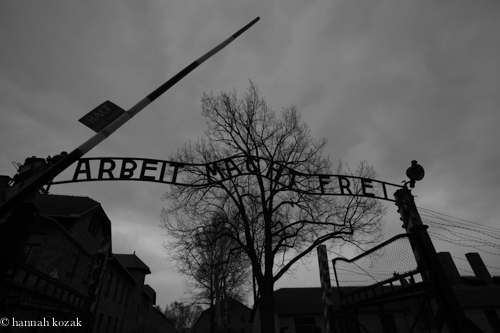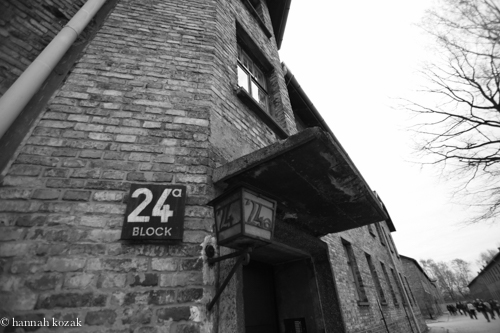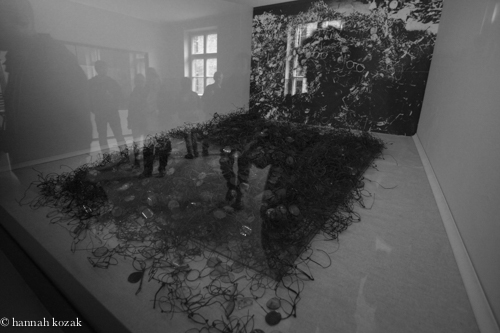Auschwitz – Remembering and Not Forgetting

Entrance to Auschwitz
I made my first sojourn to Auschwitz in 2013 and I have been haunted by the images I saw ever since. Yet I have also found Auschwitz to be a place of contemplation – an invitation to meditation. Photography has always kept me from forgetting, so camera in hand, I return to this place of killing of innocent souls hoping to honor the nameless and faceless. I can’t help but wonder if evil can’t be overcome by looking it square in the face.
Visiting Auschwitz required me to not forget the significance of its’ past, while simultaneously being forced to remember it. I read many books about the Holocaust throughout my entire life -beginning with Escape from Warsaw when I was in grade school and throughout my teens. I continued to devour similar culturally and historically relevant books when I started a project on my father’s journey from his hometown of Bedzin, Poland to many forced labor camps in Markstädt, Klettendorf, Hundsfeld , Hirschberg, Bad Warmbrunn and Ermannsdorf. He was sent to Hirschberg twice before he was liberated from Dernau on May 8, 1945. Even with such emotional proximity to this history, I still wasn’t prepared for seeing tools designed to kill people in person. Fences, barbed wire, barracks, crematorium. The controversial historian Ernst Nolte refers to the Holocaust as “a past that will not pass away.” Indeed, I have always felt the more I study the Holocaust, the less I understand about humanity.
I felt an existential delirium being in Auschwitz. Standing in line with people for the tour felt too confining, so as I have always done, I got out of line and went off on my own. Getting out of line is what saved my father’s life at the very end of his stay in those forced labor camps. He was told to get in line with all the other remaining inmates at Dernau. My father’s angels, (as he called them) or his intuition ( how I refer to his knowing), was always marvelous whether it came to people or situations. So when it told him to get out of line, he did and went immediately into the barracks. Had he not listened to that subconscious nudge, he would have ended upon a death walk with everyone else in that line. They were forced to dig their own graves before they were machine gunned down. Because my father broke the rules and got out of line, he was liberated by the Soviet armed forces one day later.





In some places, the pulse beats more than others. Poland is one of those places for me. I’ve heard people say that they could never visit Auschwitz but perhaps if they had a father that survived eight forced labor camps they would feel differently. I can’t imagine not wanting to see the labor, concentration and killing centers ** in person. Duality; making others wrong, is always judgment. I needed to see this place to help me keep remembering.





The Talmud describes the difference between remembering and not forgetting. Forgetting first occurs in the heart. It’s not cognitive. It’s the natural course of events that dispossess us from the event and then tragically, we are left devoid of the reason it was ever important to us to begin with. Remembering, on the other hand, is to engage in activities that promote remembrance.





My father found a way to make something out of nothing, so that he could survive. He created life out of a world of darkness. As a second generation Holocaust survivor, I feel it is my duty to not forget and to present the upside of my heavy heritage so it can be a catalyst, and not a yoke.









I kept mostly to myself in school almost as if I was still hiding. One side of me was a happy girl that loved to laugh; the other side was a girl with sadness so overwhelming, I could never understand where it stemmed from. As a second generation Holocaust survivor, I understand that my father’s unprocessed grief and sadness was handed down, and it’s up to me, to transform that sadness into understanding the carefully orchestrated plan of genocide because the Jews believe, “He who saves one life, saves the entire world. ” I think it’s dangerous that the suffering and struggle of my ancestors will be forgotten with the passage of time. I must tell and retell the stories of our past, so that we will remain free, in the future.
** death camp is too vague, since taken literally it evokes the image of a place in which a large number of people died, such as the footage of dead bodies taken in Dachau and Buchenwald, which misleadingly, are often shown as backdrop in documentaries on the Holocaust. “Death camp” could in theory apply to most concentration camps, many labor camps, and, in the winter of 1941/1942, virtually all camps for Soviet POWs. We prefer killing center because it denotes exactly and explicitly what the facility was established to achieve–to kill human beings as quickly and as efficiently as possible.